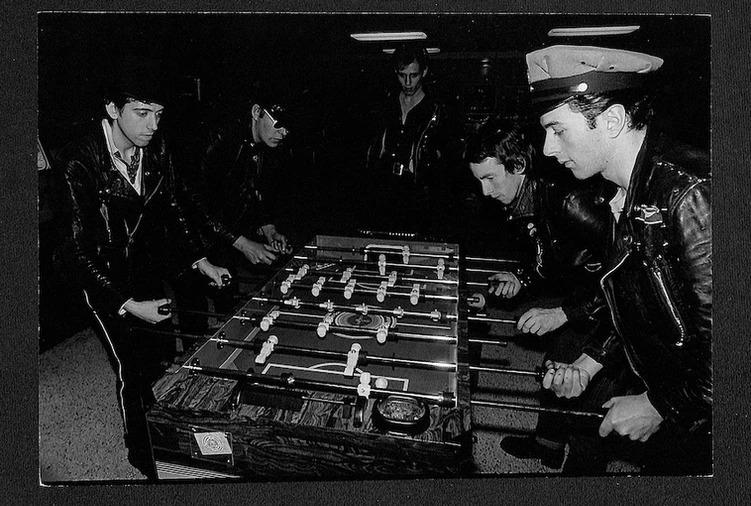As if a director had gone mad and shot a comic version of Orwell's "1984", The Clash, the heralds of the "White Riot", stomped through contemporary events; here a little visit to the front in Belfast, there a dangerous water pistol fight with harmless civilians and always the big saying about "we're the street fighting men" on their lips. This time too, it's worth listening to Tony Parsons' mocking song.
The Clash released a series of singles, all of which were probably shaped by the problems that arose from the feeling of having failed both artistically and commercially: "Clash City Rockers" followed "White Riot", "Remote Control" and then "Complete Control", after which came "White Man In Hammersmith Palais", their only reggae song. They were still a long way from even thinking about producing a second album. One reason for this was that they had decided not to work with the producer of their first LP, Mickey Foote, again, because CBS felt that the sound he had achieved was far too rough and unpolished to be able to release the record on the lucrative US market.
Initially, they had agreed to work with Foote because they felt he understood the band. All of the well-known producers who had tried to work with them during their time at Polydor Studios had been trying to give them a softer, smoother sound, to take away some of their hardness, their punk feel, and to influence Strummer to pronounce the words correctly and not to mumble so much. The Clash did not like this kind of influence. But then CBS became very firm and demanded that a famous producer make the second album. They gave the Clash that short list of CBS producers. And they meant it. You want to get rich, don't you, guys? You want your product to be released on the American market, don't you, guys? The Clash agreed... Yes, yes, yes.
I don't actually think the USA is that bad, when I think about it...
But then there was another problem: material. They had actually exhausted their themes. They had to come up with something new. And this new thing had to work. That's the bad thing about being so close to fashion: you get old-fashioned very quickly. Photo: Elaine Bryant/LFI
They try to rationalize the problem.
Strummer: I'm very defensive when I'm confronted with this political stuff. We see it as a trap, a pit that we're supposed to fall into. We want to move in any direction that suits us, even in a political direction. But when everyone says: Ah, you're political, then of course you say: Fuck it, kiss my ass, I'm going to go out and get drunk for seven days and nights and then I'm going to get my head full (a massive heroin trip) and then I'm going to cross the street and fall into the canal. Kiss my ass with your ideas. No problem. We move in any direction that suits us...
Meanwhile, behind the scenes, CBS insisted on "depoliticizing" the Clash, not realizing that if the Clash did come out with their thin-blooded, rhetorical material again, they would become the object of general ridicule and thereby pass their own death sentence - a fact that the Clash had understood many moons ago.
When CBS came up with the depoliticization, the Clash played a prudish act, which was a bit like Linda Lovelace playing a chaste, blushing little virgin who had never been touched by a human hand.
It took a while to persuade them, but they finally persuaded them.
The Clash were as political as Al Jolson was black. They just realized that it was in their interest to smear themselves with makeup before they could face the glare of the limelight.
It must be said that for many young people in England the period from the second half of 1977 to the present was perhaps the most politically active period of their lives. In August 1977, 3,000 anti-Nazi demonstrators fought a vicious street battle in Lewisham, South London, with the neo-Nazi National Front party, which was rapidly gaining ground in local elections. It was a brutal battle, acid was thrown at the 4,000 police officers separating the two rival groups (a third of the capital's entire Metropolitan Police Force was deployed that day), and when it was all over and the smoke cleared, the riots were described as the worst London had seen since the Second World War. And they gave the young, dissatisfied people who had seen punk as an outlet for their social frustrations a tangible target for everything that was wrong in the world - the neo-Nazis of the National Front. It became essential for bands to stress their anti-NF stance in interviews. Of course, none of the bands were at Lewisham; they only turned up later and gave free anti-Nazi concerts, when punk troops were being mobilized by the far left in England. The day before Lewisham, I called the Clash and asked Bernie if they were coming. "We'd really like to," said Rhodes. But we've got other commitments. Sorry." Click.
The guys couldn't come to play.
White Riot in the nose For those who were really involved, politics soon became a bitter experience (and it is pure irony that these children, as they put themselves at risk of having their faces smashed open by Nazi stones, boots and knives, were singing Clash songs. It was heartbreaking. Especially if you were one of the children yourself), and it became increasingly clear that the left was using the youth music movement in general and punk in particular for its own "revolutionary" goals. They didn't understand anything, squeezed the last drop out of everything, and were always completely intolerant of any alternatives unless they were in line with their party line.
47
SOUNDS
The Clash
Als hätte ein weggetretener Regisseur eine Ulk-Version von Orwells,,1984" gedreht, so stiefelten The Clash, die Herolde des, White Riot", durchs Zeitgeschehen; hier 'n kleiner Frontbesuch in Belfast, da 'ne gefährliche Wasserpistolen-Schlacht mit harmlosen Zivilisten und immer den dicken Spruch vonwegen, wir sind die street fighting men" auf den Lippen. Auch diesmal lohnt's sich, Tony Parsons Spottgesang zuzuhören.
D ie Clash brachten eine Reihe von Singles heraus, die wohl alle von den Problemen ge prägt waren, die sich aus dem Gefühl ergaben, sowohl künst lerisch wie kommerziell versagt zu haben: Clash City Rockers" folgte auf White Riot", Remote Control" und dann Complete Control", danach kam,, White Man In The Hammersmith Palais", ihr einziger Reggae-Song.
Noch waren sie weit davon entfernt, auch nur daran zu denken, ein zweites Album zu produzieren. Ein Grund dafür war auch, daß sie sich entschlossen hat- ten, nicht wieder mit dem Produzenten ihrer ersten LP, Mickey Foote, zu arbei ten, weil man bei der CBS der Ansicht war, daß der Sound, den er realisiert hatte, viel zu grob und ungeschliffen war, um die Platte auf dem lukrativen US-Markt veröffentlichen zu können.
Anfänglich hatte man sich geeinigt, mit Foote zu arbeiten, weil man das Ge fühl hatte, er verstünde die Band. Alle jene Produzenten mit bekannten Namen, die während der Zeit in den Polydor Studios versucht hatten, mit ihnen zu arbeiten, waren darauf ausgewesen, ihnen einen sanfteren glatteren Sound zu verpassen, ihnen etwas von ihrer Härte, ihrem Punk-Feeling, zu nehmen, und Strummer zu beeinflussen, die Wör- ter richtig auszusprechen und nicht so zu nuscheln. Den Clash gefiel eine der artige Einflußnahme nicht. Aber dann wurde man bei der CBS sehr bestimmt und verlangte, daß ein berühmter Produ- zent das zweite Album machen sollte Man gab den Clash jene kurze Liste
von CBS-Produzenten. Und man meinte es ernst. Ihr wollt doch reich werden, Jungs, oder? Ihr wollt doch, daß euer Produkt auf dem amerikanischen Markt veröffentlicht wird, oder, Jungs? Die Clash stimmten zu... Ja, ja, ja.
So beschissen find ich die USA ei- gentlich auch nicht, wenn ich mir'srecht überlege....
Aber dann gab's da noch ein anderes Problem: Material. Sie hatten ihre The men eigentlich erschöpft. Sie mußten sich was Neues einfallen lassen. Und dies
Neue mußte auch hinhauen. Das ist eben das Schlimme, wenn man haarscharf in der Mode liegt: man wird sehr schnell altmodisch.
Foto: Elaine Bryant/LFI
SOUNDS
Kollision mit der Wirklichkeit oder bei schlechtem Wetter findet der Aufstand im Studio statt ** Teil2
Dann erwischte es Joe Strummer so schlimm, daß er ins Krankenhaus mußte. Nein, nein, nicht weil die Bullen ihn zu sammenschlugen oder er etwa Opfer einer CIA-Verschwörung wurde. Nein, jemand hatte ihn angespukt.
Als es unter den Punks zu den guten Sitten zählte zu rotzen (d.h. zu spucken, entweder Bier oder tatsächlich Rotze), hatte Strummer unfreiwillig etwas ge- schluckt, das ihm eine Gelbsucht be scherte.
Und äußerte sich dazu: Is 'ne Menge Rotze in der Luft. Und ich will bestimmt nicht sagen, daß es besonders gesund ist. Und darum lieg ich hier im Krankenhaus. Ich bin näm lich kein Junkie. Also, entweder ist man Junkie oder man hat Toilettenbecken ausgeleckt oder so oder man ist stunden- lang von allen möglichen Leuten ange- spuckt worden, und das in ganz Groß- britannien. Und in Europa. Und in Ir- land. Mir hat einer mitten auf der Tournee so einen gelben Omnibus in den Hals gerotzt. Und ich hab's so einem Typen in einem Pub erzählt, und der sagt, ein Polizist bei einem Fußball- spiel, dem haben sie auch so richtig in die Fresse gerotzt, und drei Monate später ist er dann abgekratzt an einer Krankheit, die mit T' anfängt. Aberich hab' mich geweigert, das zu glauben." Strummers Krankheit war jedenfalls der Grund, warum die Band nicht mit jenem amerikanischen Produzenten ins Studio gehen konnte, den man aus der kurzen CBS-Liste ausgewählt hatte: Sandy Pearlman, zwergenwüchsige Mas termind hinter Blue Öyster Cult.
Ich glaube", sagt Mick Jones, Sandy sieht in uns die düstere Seite des Rock'n 'Roll. Kommentiert Pearlman: Die Songs von Clash haben wirklich echt subversive Qualitäten ich werde sie so aufbereiten, daß sie sich in Ame- rika verdauen lassen..."
Eigentlich hörte sich der Plan per fekt und einleuchtend an. Pearlman hatte den intensiven (wenn auch abso lut sinnlosen) Symbolismus von Blue Öyster Cult zu Breitwandformat aufge blasen, und die waren eine Bande lang haariger bärtiger Hippies, die noch vor ein paar Jahren Blumen in den Haaren und Räucherstäbchen im Arsch hatten. Die Clash hatten jede Menge Rohmate- rial. Pearlman mußte es nur richtig verpacken.... Offensichtlich machte der Widerspruch
zwischen den Clash als marktbewußte professionelle Entertainer und als radi kale Politikos, die mit redlicher Schön- rednerei gegen die Mauern von Babylon anheulen, es den kritischen Mitgliedern der Gruppe schwer, ein klares Bewußt sein zu bewahren. Sie versuchen, das Problem zu rationalisieren.
Strummer: Ich verhalte mich sehr defensiv, wenn ich mit diesem politi- schen Zeug konfrontiert werde. Wir sehen das als Falle als Grube, in die wir stürzen sollen. Wir wollen uns be- wegen in jede Richtung, die uns in den Kram paßißt, auch in eine politische Richtung. Aber wenn alle sagen: Ah, ihr seid politische, dann sagt man na- türlich: Verdammt, leck mich am Arsch, ich geh 'raus und besauf mich sie ben Tage und Nächte lang und danach knall' ich mit den Schädel voll (ein sat- ter Heroin-Trip) und dann geh ich über die Straße und fall in'n Kanal. Leckt mich am Arsch mit euren Ideen. Ge schenkt. Wir bewegen uns in jede Rich tung, die uns in Kram paßt...
Derweil bestand CBS hinter den Ku- lissen auf eine Entpolitisierung" der Clash, ohne sich vorzustellen, dafs die Clash, sollten sie tatsächlich wieder mit ihrem dünnblütigen, rethorischen Material rauskommen, zum Gegenstand des allgemeinen Gespötts werden und damit ihr eigenes Todesurteil fällen wür den eine Tatsache, die die Clash schon vor vielen Monden kapiert hatten.
Als CBS mit der Entpolitisierung kam, machten die Clash auf prüde, was ein wenig an eine Linda Lovelace erinnerte, die eine keusche, errötende kleine Jungfrau spielt, welche noch nie von einer Menschenhand berührt worden ist.
Es dauerte zwar etwas, bis sie sich breitschlagen ließen, aber schließlich ließen sie sich breitschlagen.
Die Clash waren so politisch wie Al Jolson schwarz war.
Sie schnallten lediglich, daß es in ihrem Interesse war, sich ersteinmal mit Schminke einzuschmieren, ehe sie in den grellen Schein des Rampenlichts traten.
Es muß gesagt werden, daß die Zeit von der zweiten Hälfte 1977 bis heute für viele junge Leute in England die viel- leicht politisch aktivste Zeit ihres Lebens war. Im August 1977 hatten sich 3.000 Anti-Nazi-Demonstranten eine wüste Straßenschlacht in Lewisham, South London, mit der Neo-Nazi-Par- tei National Front geliefert, welche in Kommunalwahlen rasch an Boden ge- wann. Es war eine brutale Schlacht, Säure wurde auf die 4.000 Polizisten geworfen, die die beiden rivalisieren- den Gruppen trennten (ein Drittel der gesamten Metropolitan Police Force, über die die Hauptstadt verfügt, war an jenem Tag aufgeboten), und als alles vorbei war und sich der Rauch verzog, wurden die Ausschreitungen als die schlimmsten bezeichnet, die London seit dem Zweiten Weltkrieg erlebt hat- te. Und sie gaben den jungen, unzu- friedenen Leuten, die Punk als Ventil für ihre gesellschaftlichen Frustratio- nen gesehen hatten, eine greifbare Angriffsfläche für alles, was verkehrt war in der Welt die Neo-Nazis der National Front. Es wurde für Bands unerläßlich, in Interviews ihre Anti- NF-Haltung zu betonen. Natürlich war keine der Bands in Lewisham, sie tauchten erst später auf und gaben gra- tis Anti-Nazi-Konzerte, dann nämlich als von der extremen Linken in England Punktruppen mobilisiert wurden. Am Tag vor Lewisham rief ich die Clash an und fragte Bernie, ob sie dabei seien.
„Wir würden wirklich gerne", sagte Rhodes. Aber wir
haben andere Ver- pflichtungen. Tut mir leid." Klick. Die Jungs konnten nicht kommen, um zu spielen.
White Riot in der Nase
Für die, die sich wirklich engagier- ten, wurde die Politik bald zur bit- teren Erfahrung (und es ist reinste Ironie, daß diese Kinder, als sie sich der Gefahr aussetzten, die Gesichter mit Nazi-Steinen, Stiefeln und -Messern aufgeschlagen zu kriegen, Clash-Songs auf den Lippen trugen. Es war herzzer reißend. Besonders, wenn man selbst eines der Kinder war), und es wurde immer deutlicher, daß die Linke die Jugendmusikbewegung im allgemeinen und Punk im besonderen für ihre eigenen revolutionären" Ziele benutz- te. Sie verstand nämlich nichts, wrang den letzten Tropfen aus jeder Sache, und sie war gegenüber irgendwelchen Alternativen sofern sie nicht auf ihrer Parteilinie lagen immer wieder abso lut intolerant.
47


/Daily-Mirror---Tuesday-14-August-1979-550.jpg)
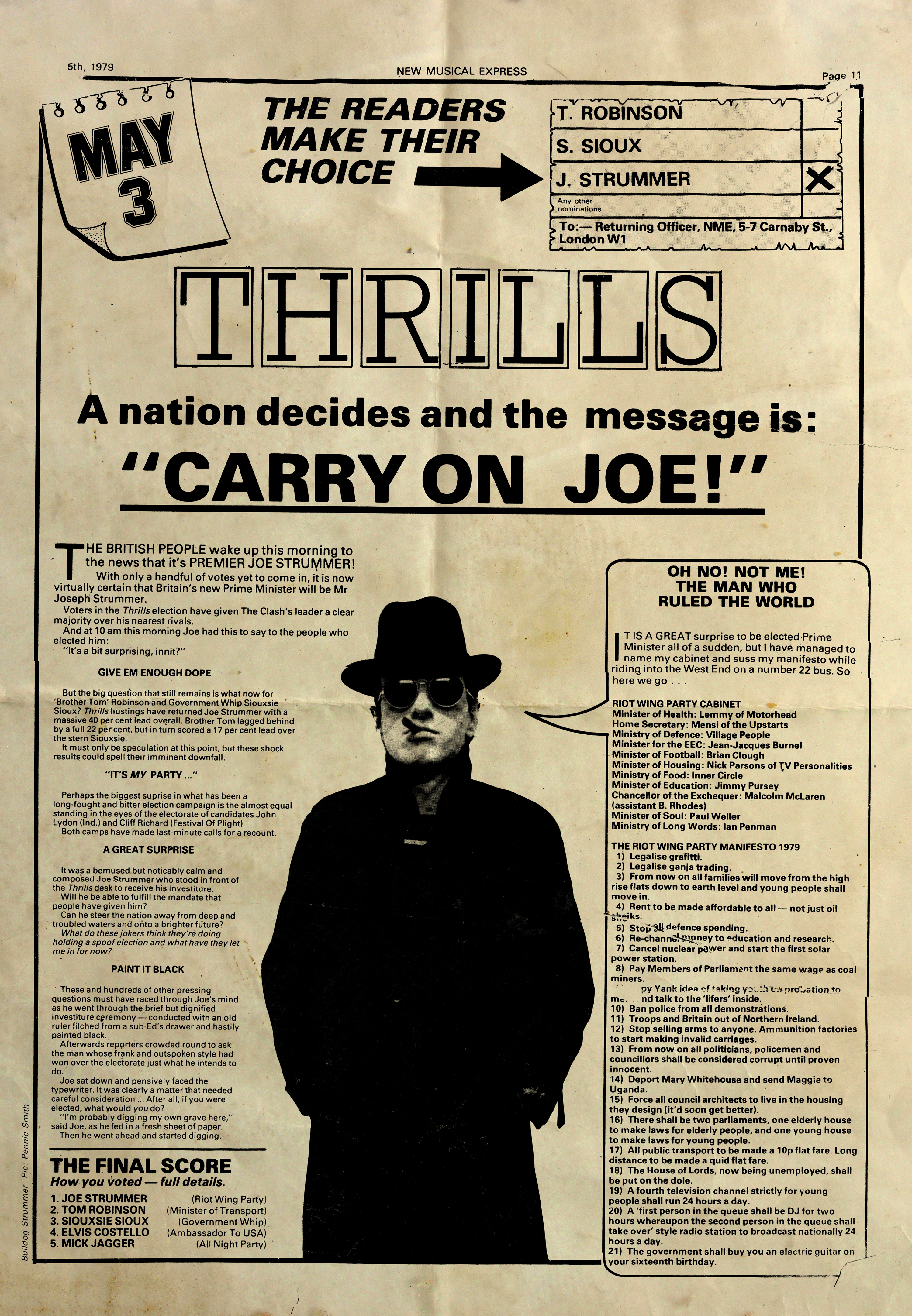

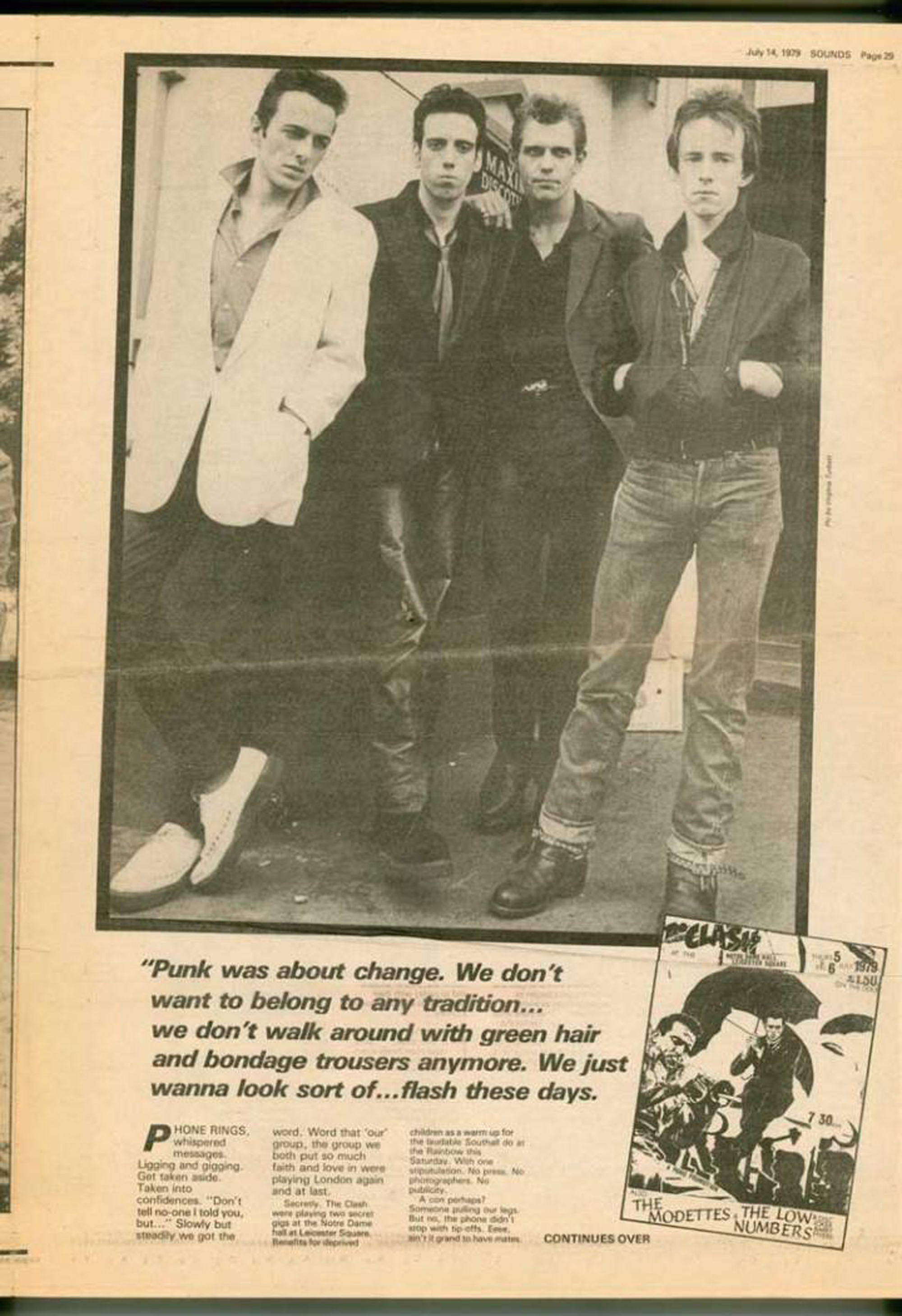
.jpg)
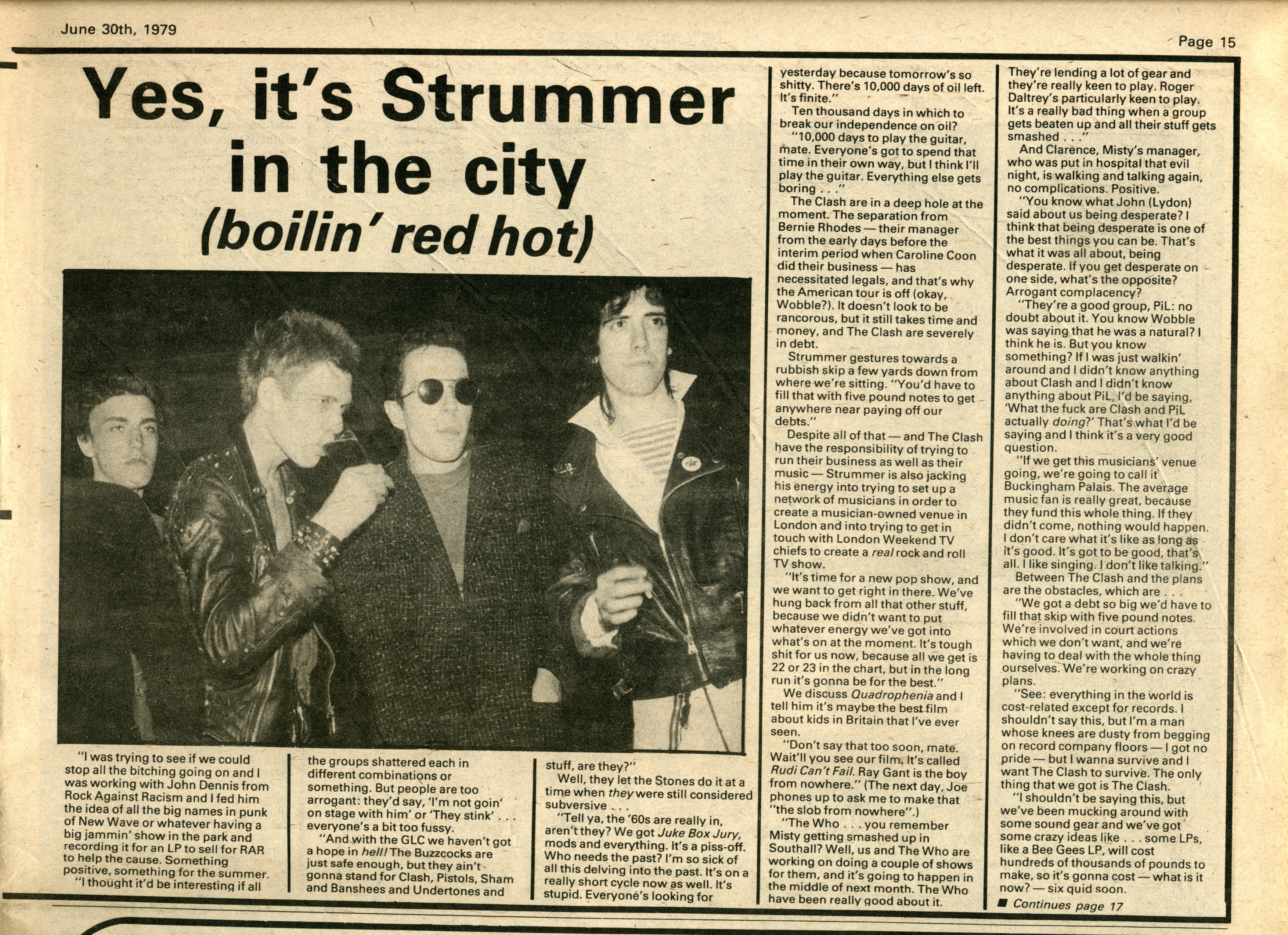
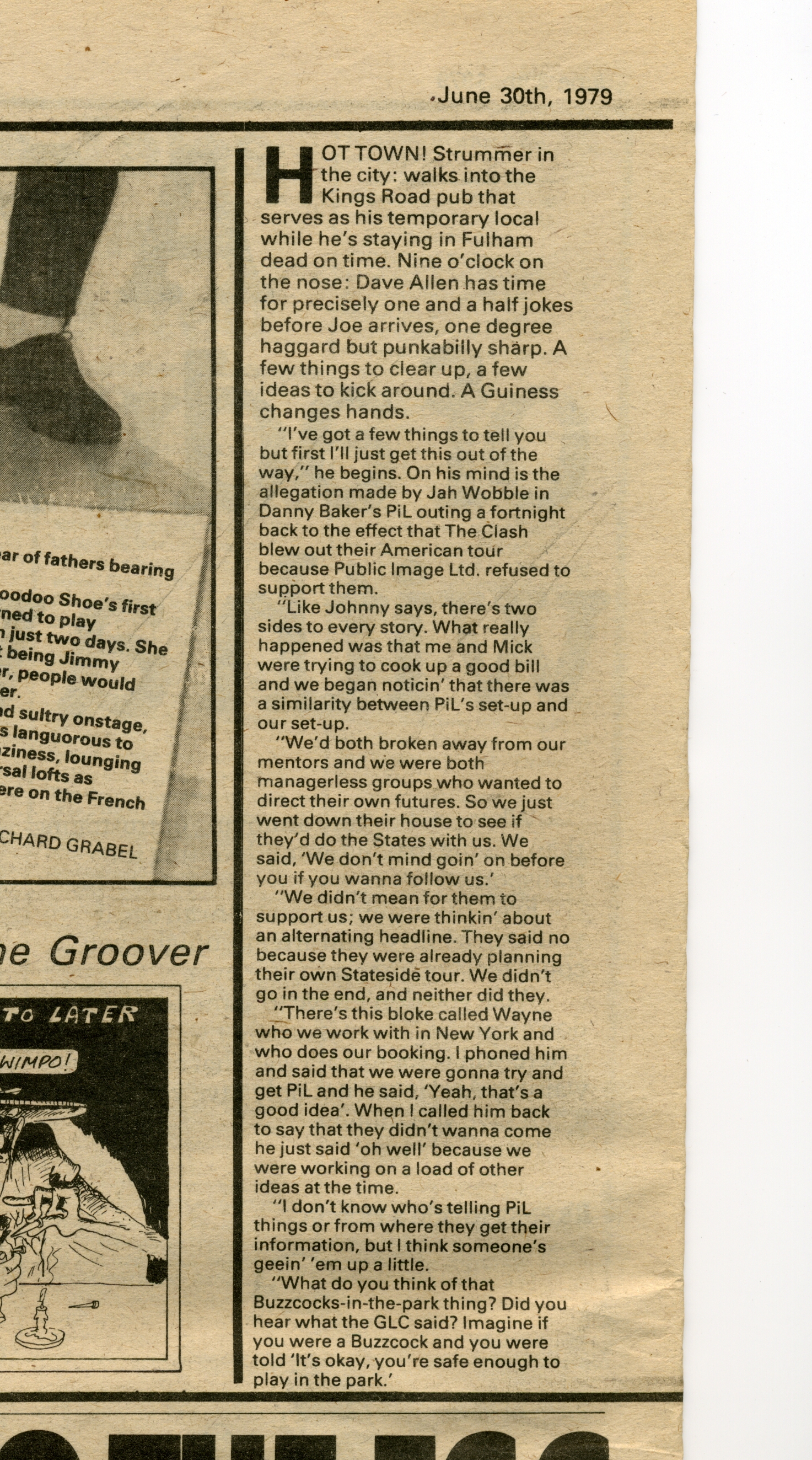
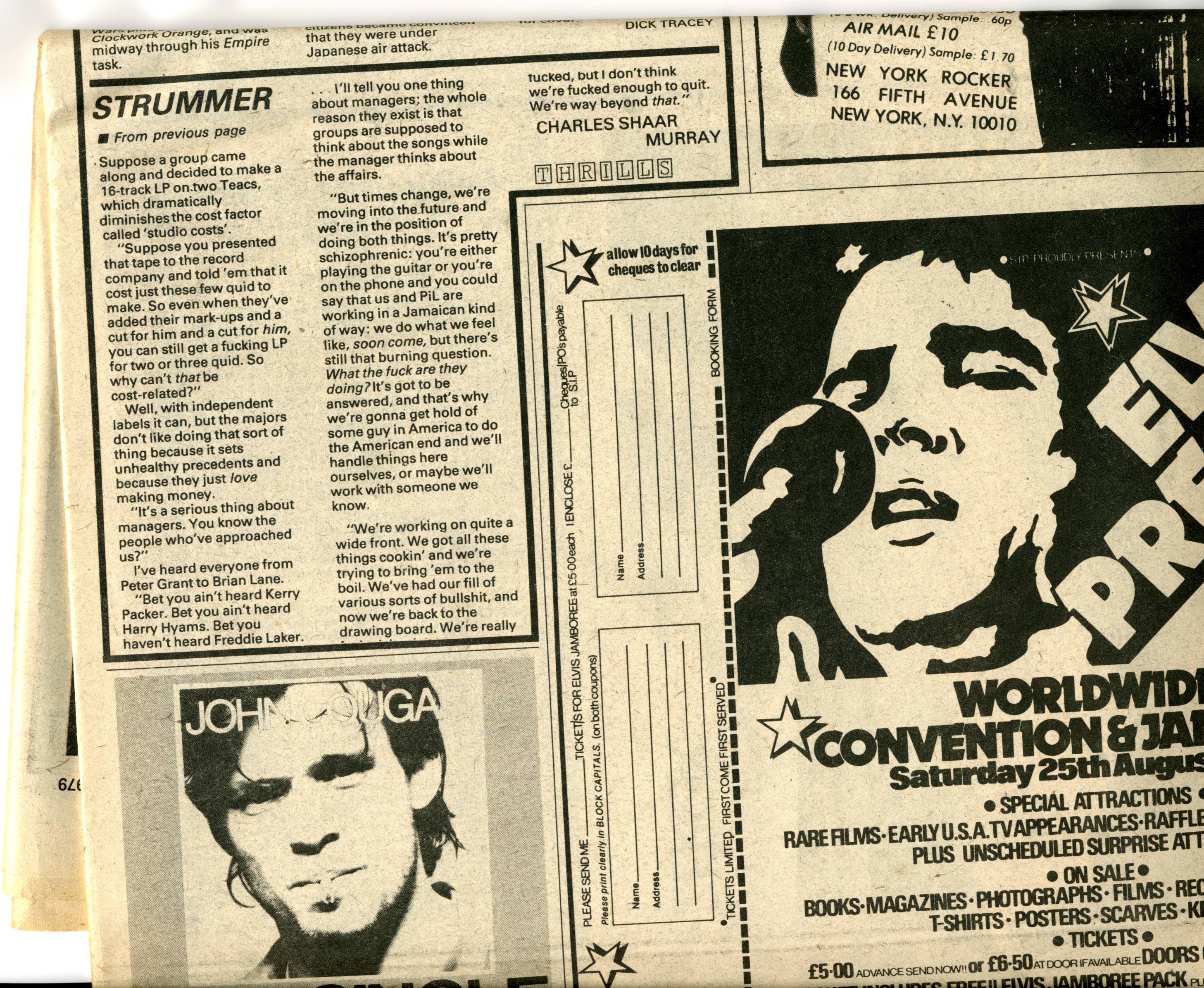
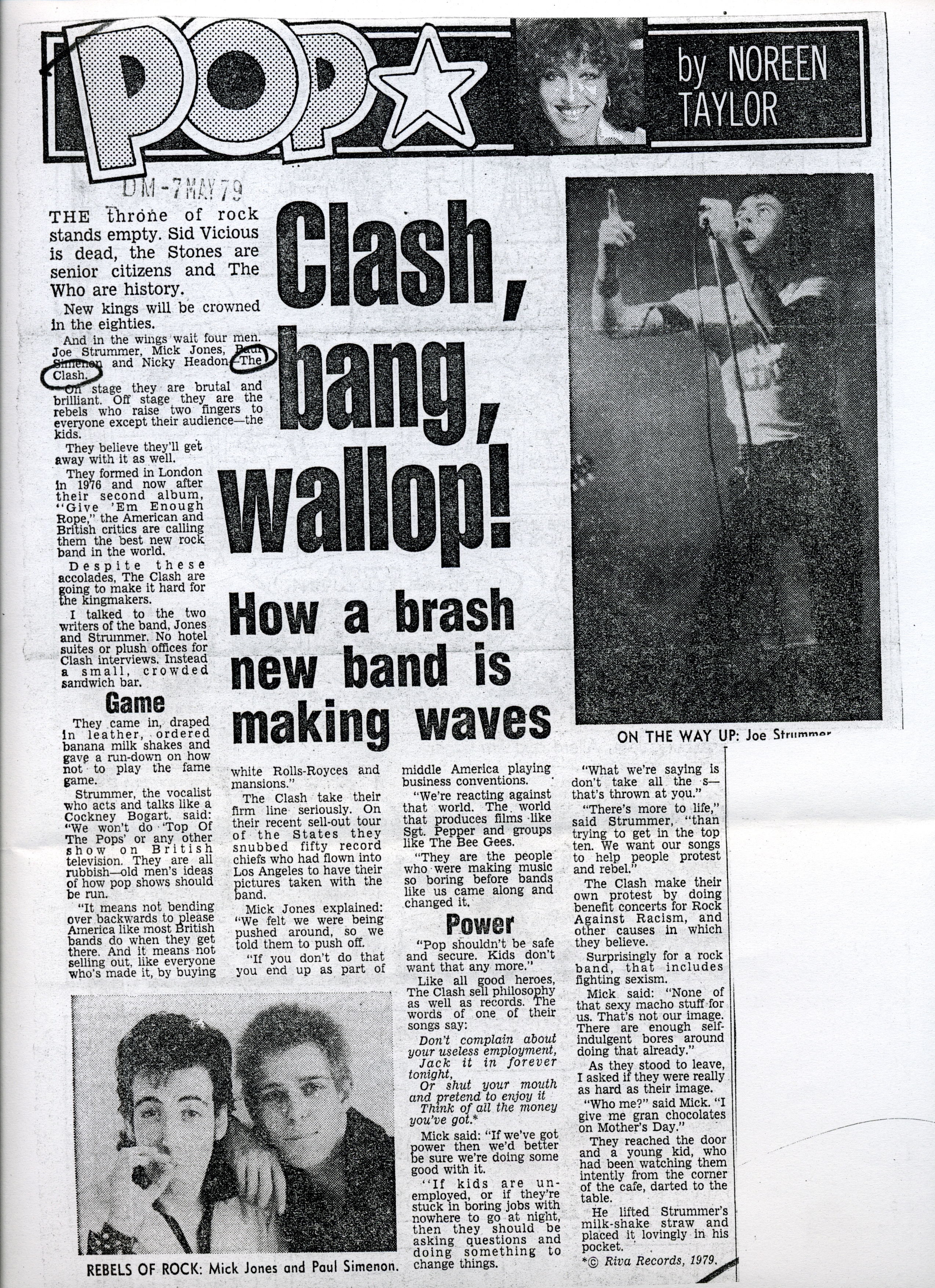
/Daily-Mirror---Monday-07-May-1979-WEB2-550.jpg)

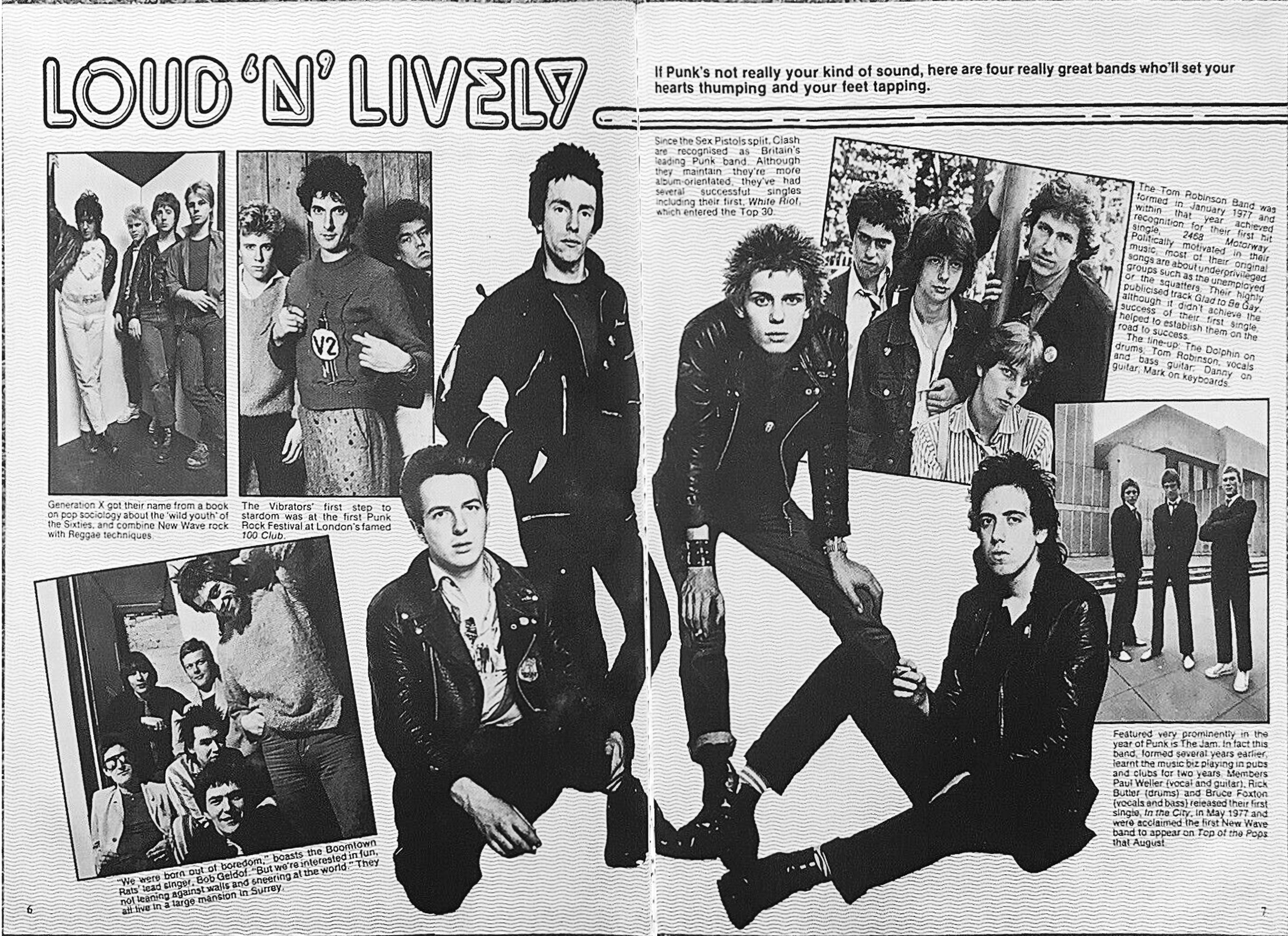

%20magazine/79%2003%2003%20Sounds%20(Germany)%20magazine.jpg)
%20SOUNDS%20Magazine%20April%201979,%20The%20Clash,%20LA%20D%c3%bcsseldorf,%20Kraftwerk,%20Cheap%20Trick,%20Berlinale/Cover.jpg)
%20SOUNDS%20Magazine%20April%201979,%20The%20Clash,%20LA%20D%c3%bcsseldorf,%20Kraftwerk,%20Cheap%20Trick,%20Berlinale/Index.jpg)
%20SOUNDS%20Magazine%20April%201979,%20The%20Clash,%20LA%20D%c3%bcsseldorf,%20Kraftwerk,%20Cheap%20Trick,%20Berlinale/3.jpg)
%20SOUNDS%20Magazine%20April%201979,%20The%20Clash,%20LA%20D%c3%bcsseldorf,%20Kraftwerk,%20Cheap%20Trick,%20Berlinale/4.jpg)

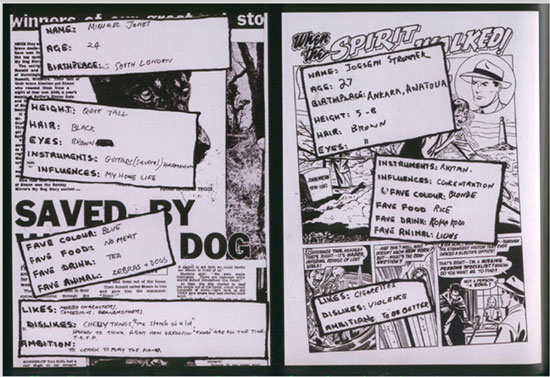

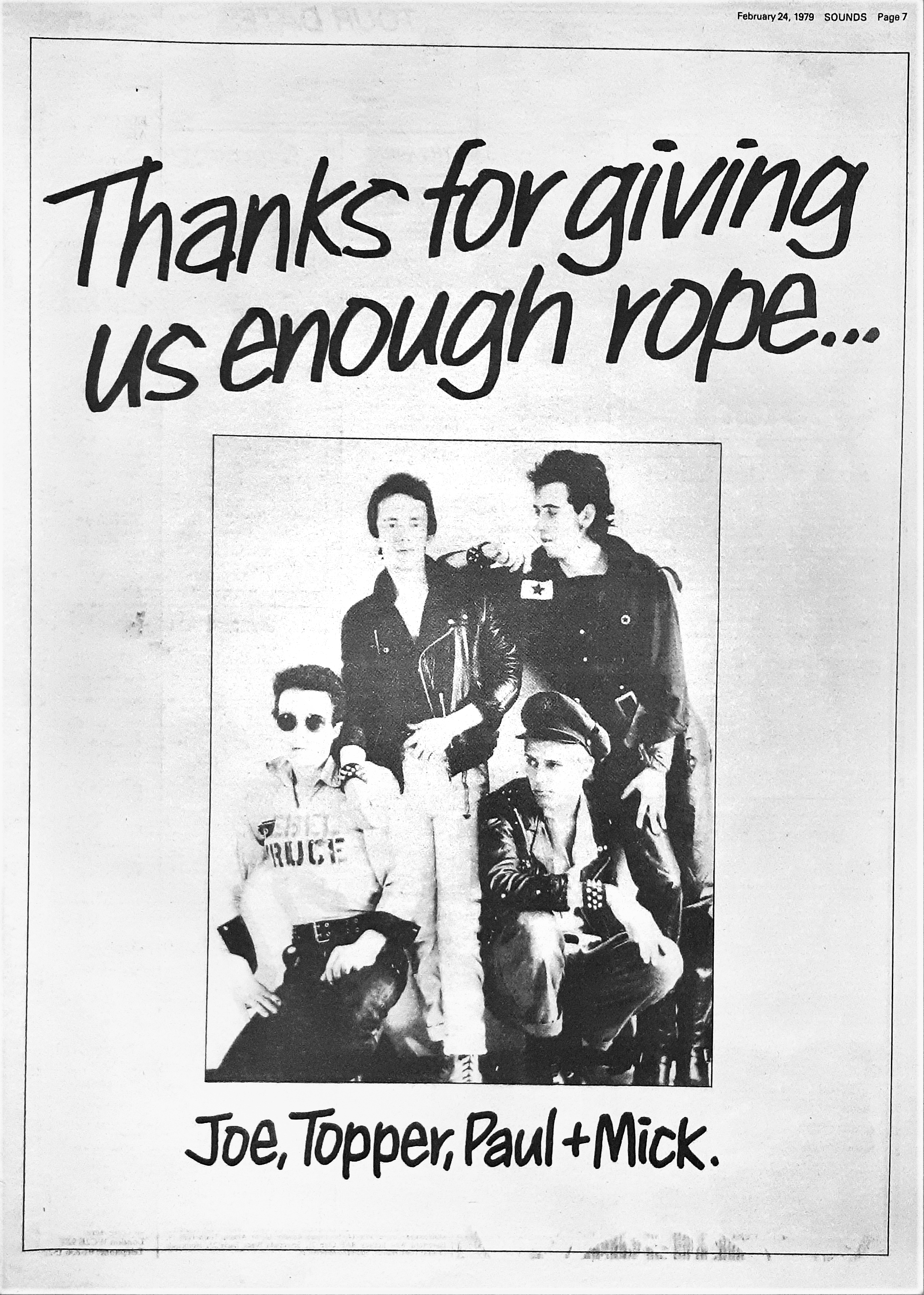
,%20JS%20int)/1.jpg)
,%20JS%20int)/2.jpg)








